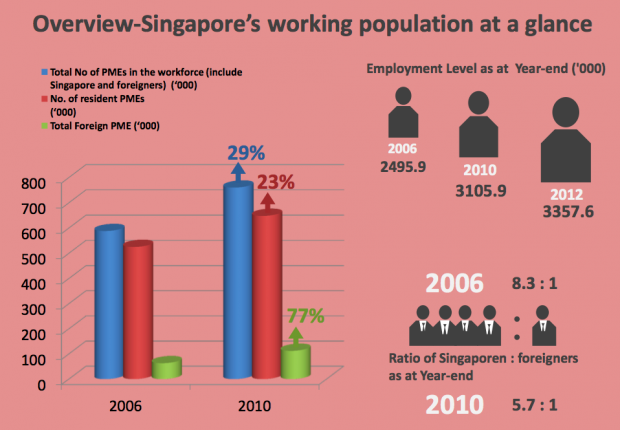For a long time, unions in Singapore have been actively representing our low wage blue collar workers and have made significant headways on productivity by helping jobs be Easier, Smarter and Safer (ESS) so that companies can be Cheaper, Better & Faster (CBF). Unions under the National Trades Union Congress (NTUC) have raised incomes through Progressive Wage Model (PWM), which has met success in the cleaning industry and are still fighting strong resistance from security associations to keep wages cheap. But what about the rights of Professionals, Managers and Executives (PMEs)? How do this group of employees get their asses protected?
Making Inclusion Space For PMEs
However, with a fast growing population of PMEs in Singapore, the workforce will be seeing significant changes in the coming years when PMEs are expected to comprise 2 in 3 workers in 20 years, up from 1 in 4 workers now.
As the Singapore workforce demographic majority changes from rank-and-file to PMEs, how do unions evolve to serve the PMEs who have a different set of workplace issues compared to rank-and-file workers?
Why The Need To Protect PMEs?
With the recent influx of foreign talents into Singapore labour market, the majority of our local PMEs feel that these foreign talents are taking away their career opportunities in Singapore. The sentiments of our local PMEs are not exactly unfounded. Singapore has experienced a 77% increase in foreign PMEs population from 2006 to 2010 although there was a relatively small 29% increase in total PME workforce.
The prevalence of foreign PMEs particularly in the banking and information technology sectors is hard to hide under the carpet, which triggered calls from NTUC to the government since 2011 to implement a form of Labour Market Testing. In response, the Ministry of Manpower (MOM) recently announced the Fair Consideration Framework in September 2013 which requires companies to advertise the job vacancy in a National Jobs Bank for at least 14 calendar days.
NTUC has also seen an increasing number of local PMEs being retrenched or tormented by work-related issues such as unfair termination or workplace discrimination.
Assistant Professor Eugene Tan from the Singapore Management University has said, “It is also important to recognise that PMEs, even if they are better educated and in a far better position to negotiate their own terms, they are ultimately coming up against employers. Given that the workforce is changing, today’s blue-collar workers would be tomorrow’s PMEs.”
Some unions currently offer PMEs limited representation in four areas – negotiations for retrenchment benefits, breach of employment contracts, appeals against wrongful dismissal, and victimisation.
How Are Unions Evolving?
NTUC has started discussions with the government and employers to increase the scope of representation of PMEs in unions. This includes the possibility of amending the Industrial Relations Act to allow unions to represent both rank-and-file and white-collar workers as currently unions are only allowed to represent one or the other.
Legal advice is also available to PME union members through Workplace Advisory apps and NTUC has been actively calling for amendments to the Employment Act to provide more workplace protection for PMEs. NTUC also set up a PME Unit to look after the needs of PMEs in terms of job protection, career progression, job placement and privileges.
NTUC also hopes to improve representation for various groups like older PME workers, self-employed and freelancers and have been organizing legal primers to address these issues.
Resistance From Employers
Not surprising, employers particularly the rogue one may be uncomfortable with more PMEs being unionised.
Ronald Lee, Managing Director of PrimeStaff Management Services, said: “Why? Because number one, it will restrict their freedom of management — the way they go about designing benefits and the way they decide to incentivise different categories of people. Obviously, they also want to be able to move in a way that the company should move, should the economic conditions change.”
However, Human Resource experts also think companies can benefit with more PMEs being unionised, as this makes it easier for employers to negotiate an agreement collectively rather than individually.
Employers Have To Evolve Too
With increasing business costs making employers jittery about wage increases (which cannot be simply solved by hiring foreigners anymore), it is ever more important for managers to understand that productivity is not just about creative reporting, but carefully scrubbing through their processes and systems to remove redundancies and hidden costs.
With productivity grants such as NTUC e2i’s Inclusive Growth Programme (IGP) financing a large portion of investments to raise productivity, employers have to step up their game too or risk losing out to cheaper, better and faster competitors.
PMEs Need To Help Themselves
Regardless of all the above efforts put in by NTUC, the toughest part of the equation is actually our own PMEs.
Few are aware of the assistance and protection that can be possibly rendered by our union. Even if they are aware, they are not fully convinced of the union’s power to represent them in the event of retrenchment and unfair treatment at work.
This is a chicken & egg game. For the union to exert a strong influence and negotiating power over employers, there has to be a substantial number of its PME union members. Other than offering retail as well as F&B promotions, NTUC will still need to aggressively court PME union members with more tangible benefits such as professional networking opportunities, career enhancement training and provision of legal advice when they need it. There should also be more real life media coverage of NTUC fighting and winning better benefits for distressed PMEs.
With so much competition from foreign talents, local PMES should take the first step to get themselves unionized, make the effort to understand their workplace rights and take note of the appropriate platforms to go to.
So are you ready to help yourself?









